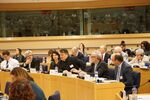Gasp of relief in Bulgaria

Supt. Daniel Topalski speaks during a CEC gathering in Brussels focusing on Religious Freedom
The Bulgarian parliament passed the final version of the new religious law – after having dropped the most prohibitive provisions. Methodists and adherents of other minority denominations expressed their thankfulness and relief.
In a first version, the new religious law had included provisions that would have restricted the future activities of many Churches – including the UMC – or that would even had endangered their existence. It was, for instance, planned to make it impossible for organizations abroad to provide financial support for religious communities in Bulgaria. In addition, the recognition of pastors who have completed their whole theological training (or part of it) abroad, was called into question. At their heart, the suggested amendments were directed against radical Islamic influences; however, they would also have had a severe impact on the UMC in Bulgaria as part of a worldwide Church. And it would certainly have been much more difficult and complicated for the Bishop of the UMC in Central and Southern Europe to execute his leadership role in Bulgaria, as well.
The first reading in the parliament was followed by a time of prayer, many intense conversations, and a variety of concrete actions. The developments had a remarkable media coverage, thousands of letters and emails were written to the decision makers in Bulgaria, and representatives of foreign governments as well as European organizations such as the Conference of European Churches took a strong stand for religious freedom in Bulgaria. In addition, Bulgaria’s capital Sofia and other Bulgarian cities saw seven weeks of public prayer meetings and peaceful protest rallies.
All these actions finally had a positive impact: before taking a final vote, the Bulgarian parliament removed those provisions from the law that would have discriminated the UMC and other minority denominations the most. This paved the way for a law, which still includes a provision that the salaries of Orthodox priests and Muslim imams will be paid by the State in the future, but which also takes seriously the concerns and perspectives of citizens with a minority faith. The international Christian connection – and not the least the strong network of the UMC in Bulgaria – bore fruit. Leaders of the UMC in Bulgaria expressed their thankfulness and relief. However, this gasp of relief should not be the end but a beginning. The local churches of the UMC in Bulgaria are called to continue being places of hope and blessing – and to prove that the members of the Bulgarian parliament did well not to restrict or even endanger witness and service of the UMC in Bulgaria.
Source: Office of Bishop Patrick Streiff, Zurich
